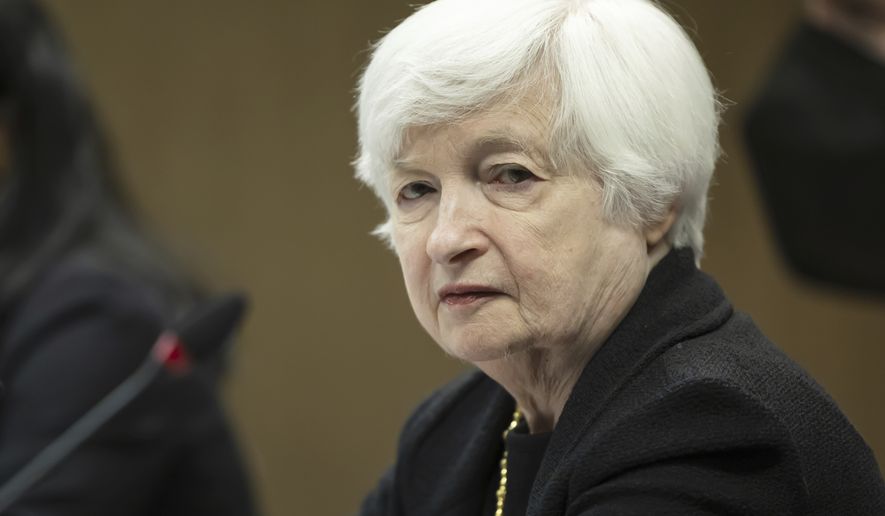The Treasury Department started taking “extraordinary measures” to stave off default Thursday as the federal government reached its legal borrowing capacity of $38.381 trillion, with no deal in sight between President Biden and House Republicans to raise the debt ceiling.
Treasury Secretary Janet Yellen told Congress the emergency accounting maneuvers include instituting a “debt issuance suspension period” that began Thursday and will run through June 5. Treasury also will not fulfill certain investments, including to the Civil Service Retirement and Disability Fund.
The moves should give the government enough financial breathing room to cover day-to-day expenses until early June.
“As I stated in my January 13 letter, the period of time that extraordinary measures may last is subject to considerable uncertainty, including the challenges of forecasting the payments and receipts of the U.S. government months into the future,” Ms. Yellen wrote. “I respectfully urge Congress to act promptly to protect the full faith and credit of the United States.”
Mr. Biden and House Speaker Kevin McCarthy, California Republican, both dug in this week on their respective positions on the debt ceiling.
The president wants Congress to raise the borrowing limit with no strings, while House Republicans want to negotiate with the administration on spending cuts as a condition for taking on more debt.
Rep. Jason Smith, Missouri Republican and House Ways and Means Committee chairman, said voters know that Washington’s accumulation of debt is “unsustainable.”
“They see how Democrats’ reckless spending has led to the worst spike in prices in 40 years that is robbing their paychecks,” Mr. Smith said. “They are looking to their elected officials for leadership — not political brinksmanship. Instead of attacking his political opponents, President Biden should be spending this time working with House Republicans to address the debt ceiling in a way that imposes some fiscal sanity.”
Rep. Scott Perry, Pennsylvania Republican and an ally of former President Donald Trump, tweeted, “Enough is enough — we must use every opportunity to rein in out-of-control spending. The debt ceiling fight IS that opportunity.”
Senate Republican Leader Mitch McConnell said Thursday in Louisville, Kentucky, that he isn’t concerned about the impasse because debt ceiling increases are “always a rather contentious effort.”
“America must never default on its debt,” Mr. McConnell told reporters. “We’ll end up in some kind of negotiation with the administration over what are the circumstances or conditions under which the debts are going to be raised.”
The White House said Thursday its position hasn’t changed now that the debt limit has been reached.
“There will be no negotiations on the debt ceiling,” said White House deputy press secretary Olivia Dalton.
Congress has increased or suspended the debt limit about 80 times since the 1960s, including three times under Mr. Trump. The national debt rose about 39% during the Trump administration, from $19.9 trillion to more than $27 trillion.
Under Mr. Biden, the debt has risen in two years from $27.7 trillion to now $38.381 trillion, or also about 39%.
White House press secretary Karine Jean-Pierre said House Republicans have a “constitutional duty” to raise the borrowing limit without conditions.
Stock markets were down Thursday amid investors’ renewed concerns about a recession. The prospect of the government defaulting on its obligations could rattle financial markets and contribute to a recession.
Maya MacGuineas, president of the Committee for a Responsible Federal Budget, said the debt ceiling “is too important to turn into a game of chicken.”
“Without qualification, the debt limit must be increased or suspended, and it should be done so as quickly as possible,” she said. “Ideally, we would return to the practice of lifting the debt ceiling without relying on extraordinary measures — which have become all too ordinary — and refrain from making the increase anything close to a last-minute showdown.”
She said lawmakers “who are rightly worried about the nation’s unsustainable borrowing path should take a hard stance against new borrowing and oppose legislation that would add to the debt while offering specific solutions to control the debt already on the books, rather than threatening not to pay the bills on borrowing that has already been incurred.”
“The debt ceiling does offer the opportunity for all lawmakers to pause, assess the fiscal situation of the nation, and take action as necessary,” she said. “We are on track to begin adding $2 trillion per year to the debt by the end of the decade. This is an urgent problem that is not getting the attention it needs.”
She said a solution would be for Congress to lift the debt ceiling “as soon as possible and at the same time put in place measures to improve our fiscal trajectory. This could include specific policies or processes such as a fiscal commission.”
• This story is based in part on wire service reports.
• Dave Boyer can be reached at dboyer@washingtontimes.com.




Please read our comment policy before commenting.